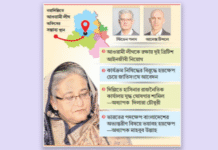
Almost every part of Bangladesh has now been affected by the deadly mosquito-borne disease, dengue, with cases reported from 61 districts until Tuesday, reports news agency UNB.
More people are being diagnosed with dengue every day. In 24 hours (until 8:00am), over 1,300 new dengue cases were reported from across the country, according to official figures.
The number of new patients was 1,096 on Monday.
 Since January, the government said 15,369 dengue patients were hospitalised. Of them, 10,953 were cured and 4,408 others are still undergoing treatment.
Since January, the government said 15,369 dengue patients were hospitalised. Of them, 10,953 were cured and 4,408 others are still undergoing treatment.
The government claims that only eight people have died of dengue this year but unofficial accounts say the number is higher.
Meanwhile, five people died of dengue in Dhaka and Barishal on Monday and Tuesday.
Their deaths were reported by the Dhaka Medical College Hospital (DMCH) and Sher-e-Bangla Medical College Hospital in Barishal.
Most of the dengue cases have been reported from Dhaka. The WHO on 20 July said the dengue situation is alarming in Bangladesh but it was not out of control.
The Directorate General of Health Services (DGHS) said 973 people were infected by dengue in Dhaka in the last 24 hours.
Apart from those in the capital, 104 others were diagnosed with dengue in Dhaka division, 55 in Chattogram, 56 in Khulna, 20 in Rangpur, 56 in Rajshahi, six in Barishal, 55 in Sylhet and nine in Mymensingh division.
 But the official number is lower than that reported by UNB correspondents.
But the official number is lower than that reported by UNB correspondents.
In Gazipur, 28 dengue patients were admitted to Shaheed Tajuddin Medical College and Hospital on Tuesday.
Hospital sources said 94 people infected with dengue had been treated in July. Accommodation problem has forced many patients to stay on the hospital floor.
In Khulna, nine people suffering from dengue were hospitalised in the last 24 hours until 6:00pm.
According to the Khulna civil surgeon’s office, the number of dengue patient in the district is 82. Of them, 43 people have returned home after taking treatment.
Currently, 27 patients are being treated at Khulna Medical College Hospital, two at Khulna General Hospital, six at City Medical College Hospital, three at Islami Bank Hospital and one at Phultala Upazila Health Complex.
In Sherpur, at least 17 people were diagnosed with dengue. Seven of them got admitted to the Sherpur District Hospital on Tuesday.
Resident medical officer Khairul Kabir Sumon said the authorities concerned have opened a separate unit at the hospital for dengue patients to provide specialised care.
In Cumilla, 17 dengue patients were hospitalised in the last 24 hours until Tuesday morning, raising the number of those diagnosed to 33.
Besides, 16 people have left the hospitals after taking treatment, said civil surgeon Mujibur Rahman.
In Pirojpur, five dengue cases were reported on Tuesday. Two of them were admitted to the Sadar Hospital while another was shifted to Sher-e-Bangla Medical College Hospital.
Another patient was admitted to Nazirpur Upazila Health Complex while a 65-year-old man was shifted to Dhaka for better treatment.
Civil surgeon Faruk Alam said they had asked for dengue test kits.
In Rajbari (Goalanda), two men, diagnosed with dengue, were admitted to Goalanda Upazila Health Complex.
Asif Mahmud, upazila health and family planning officer, said both of them had been infected with the mosquito-borne disease in Dhaka and came to the hospital on Monday.
In Jhenaidah, five dengue patients were admitted to the Sadar Hospital in the last 24 hours. So far, 21 people have been diagnosed with dengue.
In Manikganj, 44 people suffering from dengue were admitted to the Sadar Hospital in the last nine days until Tuesday. Five of them were shifted to the DMCH for better treatment.
 In Narayanganj, at least three people died of dengue so far. The district has so far reported 70 dengue cases. Fifty-one of them left hospital after receiving treatment, according to the government.
In Narayanganj, at least three people died of dengue so far. The district has so far reported 70 dengue cases. Fifty-one of them left hospital after receiving treatment, according to the government.
In Sylhet, 20 dengue patients are being treated at Osmani Medical College Hospital.
– What is dengue? –
Dengue, a mosquito-borne viral infection, causes flu-like illness, and occasionally develops into a potentially lethal complication called severe dengue.
Dengue viruses are spread to people through the bite of infected Aedes species mosquitoes. It is estimated that about half of the world’s population is now at risk of dengue, according to the WHO.
There is no specific treatment for dengue or severe dengue, but early detection and access to proper medical care lowers fatality rates below 1 per cent.
Each year, up to 400 million people are infected with dengue, according to CDC. Approximately 100 million people get sick from infection, and 22,000 die from severe dengue.
Source: Prothom Alo.









